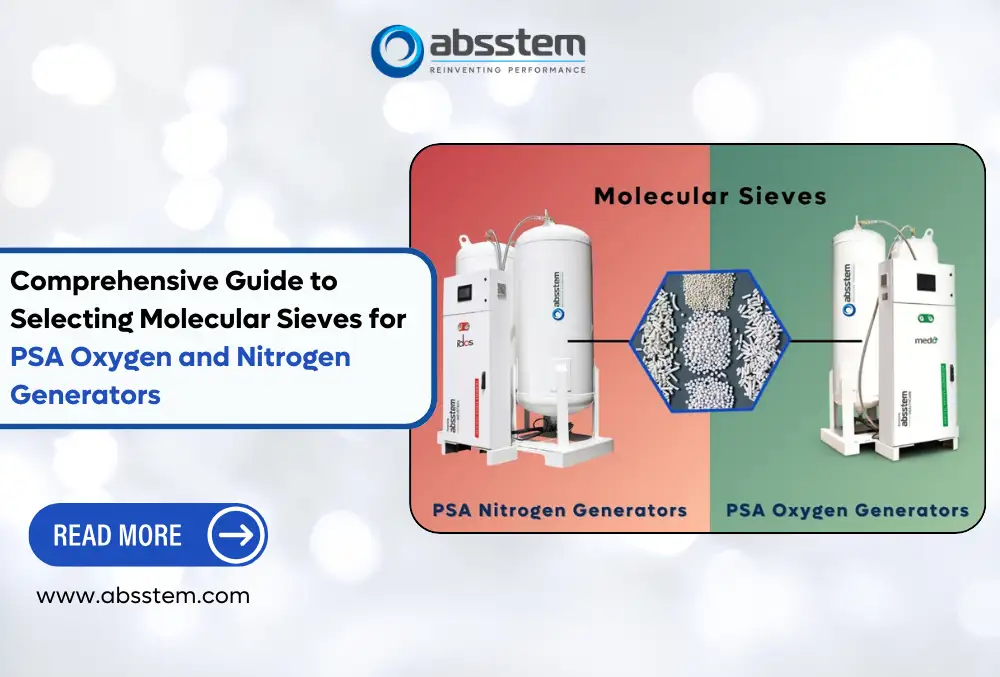Comprehensive Guide to Selecting Molecular Sieves for PSA Oxygen and Nitrogen Generators
Our earlier articles explained how molecular sieves are the backbone of Pressure Swing Adsorption (PSA) systems, playing a critical role in the gas separation process. Their efficiency directly impacts the productivity and performance of PSA oxygen and nitrogen generators.
Through this blog, we will understand the key points to remember while selecting molecular sieves for your adsorption (PSA or VPSA) system.
Understanding Molecular Sieves and Their Importance
Molecular sieves are synthetic adsorbents engineered to separate out selective components from a gaseous mixture. They are the heart of PSA and VPSA (Vacuum Pressure Swing Adsorption) systems, determining the quality and efficiency of gas production. To learn more about their structure, properties, and types, refer to our earlier blog on molecular sieves.
Key Factors to Consider When Selecting Molecular Sieves
- Productivity
Productivity measures the volume of gas adsorbed per unit of adsorbent. For instance, the productivity of Carbon Molecular Sieves (CMS) is defined by the volume of oxygen absorbed per kilogram or cubic meter of CMS.- Why It Matters: Higher productivity ensures better adsorption, translating to greater gas output for the same amount of adsorbent.
- Action Point: When comparing molecular sieves from different manufacturers, prioritize options with superior productivity metrics.
- Size and Uniformity
The size of molecular sieves is a critical parameter influencing packing density and adsorption efficiency.- Ideal Size Range: Molecular sieves typically range between 1.5 mm and 3 mm in diameter. Smaller sizes provide a higher surface area for adsorption when packed into PSA towers or adsorbers.
- Uniformity: Consistent particle size ensures even packing thereby maximizing contact with the gas stream.
- Recommendation: Opt for sieves with uniform size and within the specified range to enhance overall system efficiency.
- Crushing Strength
One of the common challenges in PSA systems is the formation of sieve powder during operational cycles. Powdering reduces efficiency and can critically damage other system components.-
- Key Attribute: High crushing strength ensures durability under operational pressure and minimizes the risk of sieve breakage or powder formation.
- Impact of Powdering: Powdered sieves can block vents or contaminate other system components, leading to increased maintenance requirements.
Tip: Choose sieves with proven mechanical strength to ensure long-term performance
-
- Selectivity
Selectivity is the ability of molecular sieves to adsorb one gas over another preferentially.- Example: CMS exhibits high selectivity for oxygen over nitrogen, enabling the efficient collection of nitrogen as the product gas.
- Why It Matters: Poor selectivity increases gas wastage and air factor (the air required to produce the desired output), leading to inefficiency.
- Action Point: Select molecular sieves in accordance with the target gas to minimize wastage to optimize separation to achieve the best air factor (Read about it here)
Additional Considerations
While the quality of molecular sieves is paramount, their performance also depends on operational factors, such as:
- Proper operation cycles.
- Quality of input gas or air.
- Regular system maintenance.
Ensuring these conditions are met is essential to achieving optimal sieve performance.
How To Buy Sieves
Purchasing molecular sieves involves identifying the right supplier and ensuring the product meets your system requirements.
Direct Purchases from Manufacturers or Distributors
Molecular sieves can be procured either directly from manufacturers or through their authorized distributors.
- Prominent CMS Brands: Carbotech, Kuraray, and UOP
- Notable Zeolite Molecular Sieve Brands: CECA and UOP
Recommendation: Whenever possible, buy from manufacturers of adsorption systems, as they can provide valuable support for operation cycles and system design.
Packaging and Warranty
- Standard Packaging: Molecular sieves are typically supplied in vacuum-sealed drums to prevent moisture absorption.
- Warranty Limitations: All sieve manufacturers do not offer any warranties once the packaging is opened due to potential exposure to contaminants. Their warranty is limited to manufacturing defects and does not cover performance warranty.
Absstem Advantage: Unlike standard suppliers, Absstem provides a 10-year* warranty on molecular sieves (both CMS and Zeolite Molecular Sieves) for PSA oxygen systems and PSA nitrogen systems. This eliminates the need for frequent replacements or top-ups, ensuring peace of mind for our customers.
Why Choose the Right Molecular Sieves?
The performance of PSA systems hinges on the quality and characteristics of molecular sieves. Any compromise on this may lead to:
- Reduced productivity.
- Increased maintenance costs.
- Lower system efficiency.
Investing in high-quality sieves tailored to your system’s requirements is crucial for long-term operational success.
Conclusion
Selecting and buying molecular sieves for PSA oxygen and nitrogen generators is a critical decision that affects system efficiency, productivity, and long-term reliability. Key considerations include productivity, size, crushing strength, and selectivity, all of which influence the overall performance of your adsorption system.
To ensure the best results, partner with reputable manufacturers who can provide both high-quality sieves and technical support. At Absstem, we not only supply industry-leading molecular sieves but also back them with a decade-long warranty and expert guidance tailored to your needs.
Contact Us
If you are looking to purchase molecular sieves or need expert advice on optimizing your PSA system, our experienced team is here to assist. Contact us at [email protected] or call our toll-free number 1800 3010 3394.
* Terms and conditions apply.
